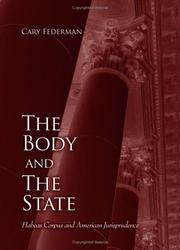| Listing 1 - 10 of 26 | << page >> |
Sort by
|
Book
ISBN: 0669030236 Year: 1980 Publisher: Lexington (Mass.) : Lexington books,
Abstract | Keywords | Export | Availability | Bookmark
 Loading...
Loading...Choose an application
- Reference Manager
- EndNote
- RefWorks (Direct export to RefWorks)
Book
ISBN: 0230216919 9780230216907 9780230216914 Year: 2013 Publisher: Basingstoke Palgrave Macmillan
Abstract | Keywords | Export | Availability | Bookmark
 Loading...
Loading...Choose an application
- Reference Manager
- EndNote
- RefWorks (Direct export to RefWorks)
Book
Year: 2021 Publisher: [Washington, D.C.] : U.S. Department of Justice, Office of Justice Programs, Bureau of Justice Assistance,
Abstract | Keywords | Export | Availability | Bookmark
 Loading...
Loading...Choose an application
- Reference Manager
- EndNote
- RefWorks (Direct export to RefWorks)
Book
ISBN: 386113120X Year: 2000 Publisher: Freiburg im Breisgau : Iuscrim,
Abstract | Keywords | Export | Availability | Bookmark
 Loading...
Loading...Choose an application
- Reference Manager
- EndNote
- RefWorks (Direct export to RefWorks)
Appellate procedure --- Criminal procedure --- Post-conviction remedies
Book
Year: 2002
Abstract | Keywords | Export | Availability | Bookmark
 Loading...
Loading...Choose an application
- Reference Manager
- EndNote
- RefWorks (Direct export to RefWorks)
Capital punishment --- Attorney and client --- Post-conviction remedies --- Social science --- Law
Book
Year: 2001 Publisher: Washington U.S. Government Printing Office
Abstract | Keywords | Export | Availability | Bookmark
 Loading...
Loading...Choose an application
- Reference Manager
- EndNote
- RefWorks (Direct export to RefWorks)
DNA fingerprinting --- Post-conviction remedies --- Judicial error --- Criminal investigation --- Law --- Social science
Book
Year: 2014 Publisher: Washington : U.S. Government Printing Office,
Abstract | Keywords | Export | Availability | Bookmark
 Loading...
Loading...Choose an application
- Reference Manager
- EndNote
- RefWorks (Direct export to RefWorks)
Judicial error --- DNA fingerprinting --- Forensic genetics --- Evidence, Criminal --- Post-conviction remedies --- Capital punishment --- Prevention.
Book
ISBN: 0199366667 0190855525 Year: 2017 Publisher: New York, NY : Oxford University Press,
Abstract | Keywords | Export | Availability | Bookmark
 Loading...
Loading...Choose an application
- Reference Manager
- EndNote
- RefWorks (Direct export to RefWorks)
A comprehensive account of the role of habeas corpus in wartime, this book draws on a wealth of untapped resources to shed light on the political and legal understanding of habeas corpus that has unfolded over the course of Anglo-American history. The book traces the roots of the habeas privilege enshrined in the United States Constitution to England and then carries the story forward to document the profound influence of English law on early American law.
Habeas corpus --- History. --- Civil rights --- Constitutional law --- Criminal procedure --- Detention of persons --- Extraordinary remedies --- Martial law --- Post-conviction remedies --- Writs

ISBN: 0791482022 1429411791 9781429411790 0791467031 9780791467039 9780791482025 Year: 2006 Publisher: Albany : State University of New York Press,
Abstract | Keywords | Export | Availability | Bookmark
 Loading...
Loading...Choose an application
- Reference Manager
- EndNote
- RefWorks (Direct export to RefWorks)
The writ of habeas corpus is the principal means by which state prisoners, many on death row, attack the constitutionality of their conviction in federal courts. In The Body and the State, Cary Federman contends that habeas corpus is more than just a get-out-of-jail-free card—it gives death row inmates a constitutional means of overturning a jury's mistaken determination of guilt. Tracing the history of the writ since 1789, Federman examines its influence on federal-state relations and argues that habeas corpus petitions turn legal language upside down, threatening the states' sovereign judgment to convict and execute criminals as well as upsetting the discourse, created by the Supreme Court, that the federal-state relationship ought not be disturbed by convicted criminals making habeas corpus appeals. He pays particular attention to the changes in the discourse over federalism and capital punishment that have restricted the writ's application over time.
Habeas corpus --- Civil rights --- Constitutional law --- Criminal procedure --- Detention of persons --- Extraordinary remedies --- Martial law --- Post-conviction remedies --- Writs --- History.
Book
Year: 2009 Publisher: Washington : U.S. G.P.O.,
Abstract | Keywords | Export | Availability | Bookmark
 Loading...
Loading...Choose an application
- Reference Manager
- EndNote
- RefWorks (Direct export to RefWorks)
DNA fingerprinting --- DNA fingerprinting --- Judicial error --- Post-conviction remedies --- Evidence, Criminal --- Capital punishment --- Law and legislation --- States --- Finance. --- Prevention.
| Listing 1 - 10 of 26 | << page >> |
Sort by
|

 Search
Search Feedback
Feedback About UniCat
About UniCat  Help
Help News
News